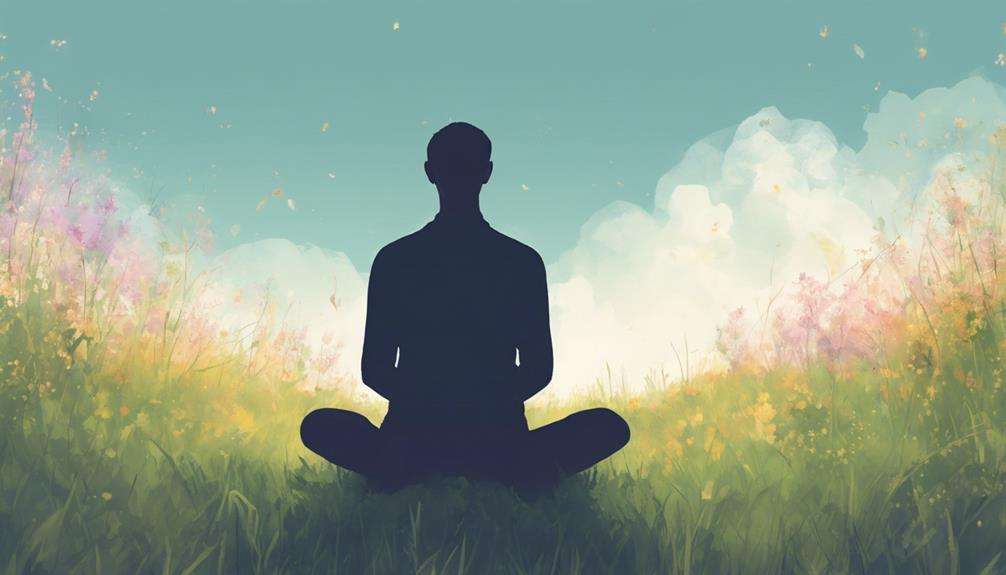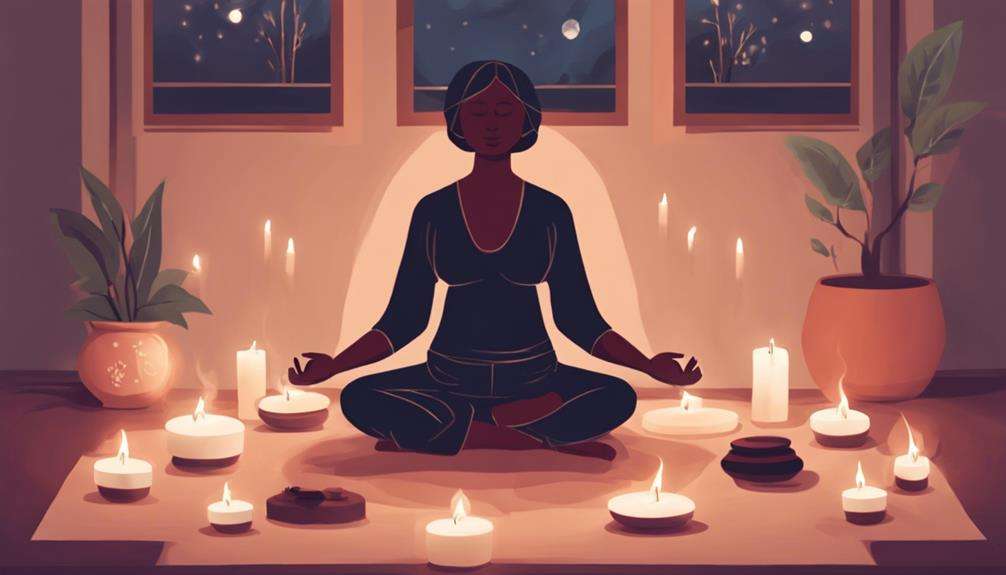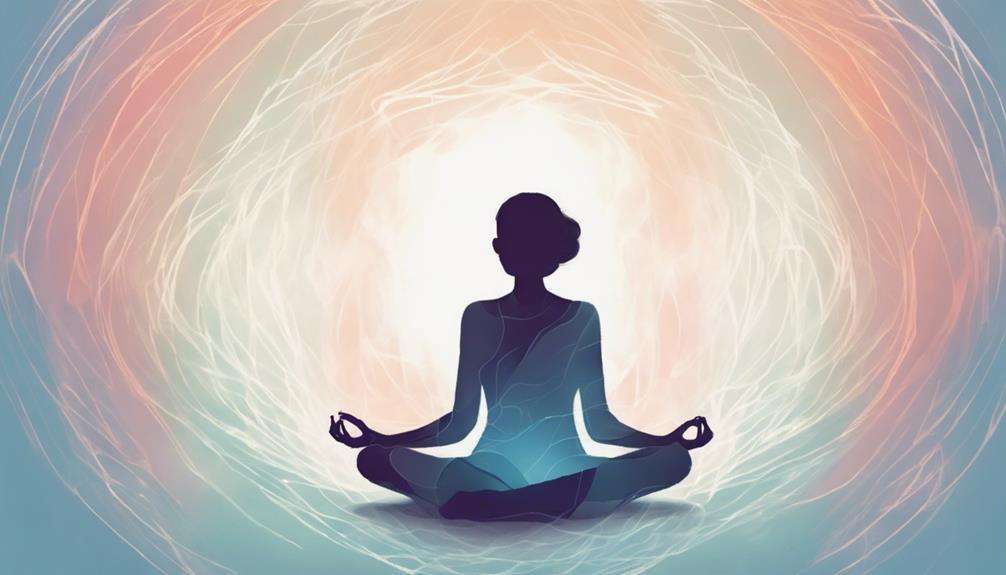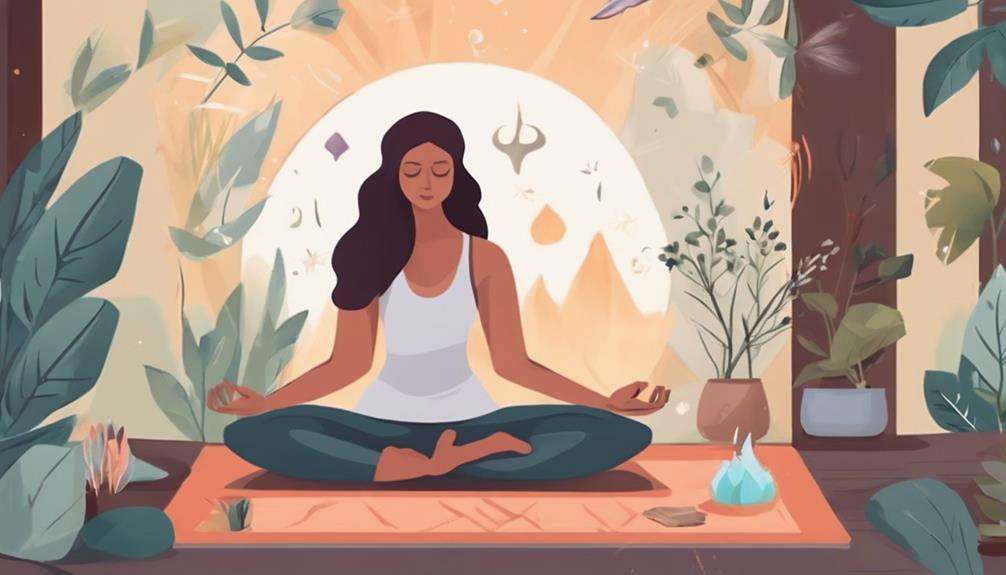Are you tired of feeling overwhelmed by anxiety and seeking effective ways to find calmness within?
Discover how meditation can be a powerful tool in reducing anxiety and promoting emotional well-being.
By exploring the ten methods outlined, you can begin to cultivate a sense of peace and balance in your daily life.
Key Takeaways
- Mindfulness meditation and body scan techniques reduce anxiety levels effectively.
- Guided meditation practices like progressive muscle relaxation aid in anxiety relief.
- Benefits include improved emotional regulation, lowered stress, and enhanced resilience.
- Long-term meditation leads to emotional balance, inner peace, and reduced anxiety triggers.
Mindfulness Meditation for Anxiety Reduction
If you're looking to reduce anxiety in your life, mindfulness meditation offers a powerful technique to help you stay present and manage your emotions effectively. Mindfulness meditation involves focusing on the present moment without judgment, which can significantly reduce symptoms of anxiety. Studies have shown that this practice can decrease anxiety disorders' symptoms by enhancing self-awareness and emotional regulation skills. By regularly engaging in mindfulness meditation, you can experience changes in brain regions associated with stress and anxiety, leading to increased resilience.
Techniques like body scan meditation and mindful breathing exercises are particularly effective in managing anxiety triggers. By integrating mindfulness meditation into your daily routine, you can learn to cope with anxiety more efficiently and improve your overall mental well-being. This evidence-based approach can provide you with the tools to navigate through challenging emotions and cultivate a sense of inner peace and calmness. Start incorporating mindfulness meditation into your daily life to experience the benefits firsthand.
Loving-Kindness Meditation for Anxiety Relief
When practicing Loving-Kindness Meditation, you focus on sending wishes of well-being to yourself and others, fostering compassion and kindness.
Studies indicate that this form of meditation can effectively reduce symptoms of anxiety while boosting positive emotions.
Compassion for Self
To cultivate compassion for yourself and alleviate anxiety, engaging in Loving-Kindness Meditation can be a powerful practice. This form of meditation involves sending wishes of well-being and kindness not only to others but also to yourself. Studies indicate that Loving-Kindness Meditation is effective in reducing symptoms of anxiety by promoting self-compassion and diminishing self-criticism, which are often prevalent in anxiety disorders.
Sending Love Outward
Transitioning from cultivating self-compassion to extending kindness outward, Loving-Kindness Meditation offers a powerful method for relieving anxiety by fostering positive intentions towards oneself and others. This practice involves sending well-wishes and positive intentions to all beings, including yourself, which can have profound effects on your mental well-being.
Here's why Loving-Kindness Meditation is beneficial for anxiety relief:
- Increased Compassion: By practicing loving-kindness, you can enhance feelings of compassion towards yourself and others.
- Emotional Well-Being: This meditation technique can promote emotional well-being by cultivating empathy and fostering social connections.
- Shift from Criticism to Compassion: Focusing on love and kindness helps in transitioning from self-criticism to self-compassion, reducing anxiety.
- Positive Outlook: Regular practice of Loving-Kindness Meditation can lead to a more positive outlook, reduced stress, and improved mental health.
Body Scan Meditation for Calming Anxiety

When feeling anxious, body scan meditation becomes a valuable tool in your relaxation kit.
By focusing on each body part, you can release tension gradually, promoting a sense of calmness.
This practice helps in grounding you in the present moment and alleviating physical symptoms of anxiety.
Deep Breathing Relaxation
Engage in deep breathing relaxation through body scan meditation to effectively calm anxiety and promote a sense of inner peace. Body scan meditation offers a structured approach to easing stress and anxiety by focusing on different parts of the body.
Here's how it can help reduce anxiety and enhance well-being:
- Mindful Awareness: By systematically scanning your body, you cultivate mindfulness and presence in the moment.
- Tension Release: Deep breathing techniques aid in releasing physical tension and calming the nervous system.
- Stress Reduction: Regular practice can lead to decreased stress levels and an overall sense of relaxation.
- Improved Sleep: Body scan meditation has been linked to better sleep quality, contributing to a more restful state and improved mental health.
Mindful Body Awareness
To effectively calm anxiety and deepen your mind-body connection, practicing mindful body awareness through body scan meditation can be highly beneficial.
Body scan meditation involves systematically focusing on different body parts to bring awareness and relaxation, promoting mindfulness and aiding in anxiety reduction. By scanning from head to toe, you can release stored tension and stress, revealing physical sensations related to anxiety for release.
Regular practice enhances self-awareness and reduces physical symptoms of anxiety. This technique not only helps in calming the mind but also fosters a deeper understanding of how anxiety manifests in the body.
Incorporating body scan meditation into your routine can be a powerful tool in managing anxiety and promoting overall well-being.
Guided Meditation Techniques for Anxiety
Incorporating guided meditation into your daily routine can be a highly effective method for managing anxiety and enhancing your mental well-being. Guided meditation involves following instructions from a teacher or guide to help calm anxiety, providing structured support for those seeking specific anxiety relief.
Research shows that guided meditation can reduce symptoms of anxiety and improve overall mental well-being. These sessions are available online, offering easy access and flexibility in managing anxiety.
Here are four ways guided meditation techniques can help reduce anxiety:
- Structured Support: Guided meditation provides a clear framework for individuals new to meditation, making it easier to start and stick with a practice.
- Focused Attention: By following the guidance, you can direct your attention away from anxious thoughts and towards relaxation.
- Calming Guidance: The soothing voice of the guide can help ease tension and promote a sense of calm.
- Online Accessibility: With guided meditations available online, you can practice anytime, anywhere, fitting it into your schedule for consistent anxiety relief.
Breath Awareness Meditation for Anxiety

When feeling overwhelmed by anxiety, turning to breath awareness meditation can offer a sense of calm.
By focusing on the natural rhythm of your breath, you can ground yourself in the present moment, easing stress and promoting relaxation.
Practicing mindful breathing exercises regularly can enhance self-awareness and help you better manage anxiety symptoms.
Calming Breath Techniques
Focusing on the natural rhythm of your breath can be a powerful technique to calm your mind and body, known as breath awareness meditation. By paying attention to each breath, you can effectively manage anxiety and promote a sense of inner peace.
Here are some key points to consider:
- Stay Present: Engage in breath awareness by counting your breaths or feeling the sensations of each inhalation and exhalation.
- Reduce Anxiety Symptoms: Research indicates that breath awareness meditation can lower anxiety levels by fostering relaxation and mindfulness.
- Enhance Emotional Resilience: Regular practice of this technique can boost emotional strength and decrease the impact of anxiety triggers.
- Manage Anxious Thoughts: Directing your focus to the breath helps in handling anxious thoughts and cultivating a state of tranquility.
Mindful Breathing Exercises
To effectively manage anxiety and promote relaxation, engage in mindful breathing exercises like breath awareness meditation. These practices involve paying close attention to the natural flow of your breath. By focusing on the sensations of each inhale and exhale, you can quiet the mind, alleviate stress, and induce a sense of calm.
Mindful breathing exercises serve as a powerful tool to ground yourself in the present moment, diverting your attention from worrisome thoughts that contribute to anxiety. This technique triggers the body's relaxation response, leading to a reduction in anxiety symptoms.
Consistent practice of breath awareness meditation enhances your capacity to cope with anxiety, fostering a greater inner peace and overall well-being.
Progressive Muscle Relaxation for Anxiety Management
Regularly practicing Progressive Muscle Relaxation (PMR) can significantly reduce anxiety levels by systematically releasing tension from different muscle groups in the body. PMR is a powerful technique for anxiety management, as it targets both the physical and mental aspects of stress.
Here's why PMR is effective for anxiety relief:
- Muscle Tension Release: By tensing and then relaxing muscles, PMR helps release built-up tension, promoting a sense of physical relaxation.
- Mind-Body Connection: This technique emphasizes the connection between physical relaxation and mental calmness, aiding in reducing anxiety symptoms.
- Accessible Practice: Whether seated or lying down, PMR can be easily incorporated into daily routines, making it convenient for managing anxiety.
- Research Backed: Studies support the benefits of PMR in lowering anxiety levels, validating its effectiveness as a tool in anxiety management strategies.
Incorporating PMR into your routine can offer a holistic approach to anxiety management, providing relief by unwinding both the body and mind.
Grounding Techniques for Anxiety Reduction

Grounding techniques, incorporating sensory experiences like touch, sight, sound, taste, and smell, are effective strategies for reducing anxiety symptoms by promoting present moment awareness and connection to the surroundings. When you feel overwhelmed by anxiety, these techniques can help you anchor yourself in the present reality.
By engaging your senses, grounding exercises shift your focus away from anxious thoughts and towards the physical sensations around you. For example, you can try focusing on the feeling of your feet on the ground, the sights and colors in your environment, or the sounds of nature or calming music. These sensory experiences can act as a powerful distraction from anxiety, helping you feel more grounded and centered.
Regular practice of grounding techniques can enhance your ability to cope with anxiety triggers and cultivate a sense of inner peace and calmness. Give these techniques a try whenever you feel anxious to reconnect with the present moment and alleviate your symptoms.
Mantra Meditation for Anxiety Relief
Engage in mantra meditation as a powerful practice for alleviating anxiety symptoms and promoting inner peace and relaxation. Mantra meditation involves repeating a calming word or phrase, redirecting the mind from anxious thoughts to a positive focus. This practice can reduce stress hormones like cortisol and promote relaxation, offering a simple yet effective tool for managing anxiety daily. Research suggests that mantra meditation not only improves mental well-being but also leads to reduced anxiety levels over time.
Benefits of Mantra Meditation for Anxiety Relief:
- Calming Repetition: By repeating a mantra, you create a sense of calm and focus.
- Mind Redirection: Mantra meditation shifts your attention away from anxiety towards positivity.
- Stress Hormone Reduction: It helps lower stress hormones like cortisol, promoting relaxation.
- Long-Term Anxiety Management: Regular practice can lead to improved mental well-being and reduced anxiety levels.
Visualization Meditation for Anxiety Reduction

Visualization meditation can be a transformative practice for reducing anxiety levels by harnessing the power of mental imagery to promote relaxation and emotional well-being. This technique involves imagining calming scenes or scenarios to help redirect your focus from anxious thoughts to positive mental imagery. Research has shown that engaging in vivid mental imagery during meditation can effectively lower cortisol levels, the stress hormone, leading to a sense of peace and tranquility. By incorporating visualization meditation into your daily routine, you can create a mental sanctuary where you feel safe and calm, combating the symptoms of anxiety.
Through visualization meditation, you can immerse yourself in a world of serene landscapes, soothing sounds, or comforting sensations, allowing your mind to escape the grip of stress and worry. This practice enables you to cultivate a sense of inner peace and emotional balance, helping you navigate through difficult moments with greater resilience and clarity. By embracing positive mental imagery during meditation, you empower yourself to confront anxiety and promote a state of relaxation and well-being.
Mindfulness-Based Stress Reduction Techniques
Utilizing Mindfulness-Based Stress Reduction techniques can significantly enhance your ability to manage stress and anxiety effectively. This structured program, combining mindfulness meditation and yoga, was developed by Jon Kabat-Zinn and has shown promising results in reducing anxiety and depression while improving overall quality of life.
Here are four key aspects of Mindfulness-Based Stress Reduction:
- Focus on the Present: MBSR teaches individuals to direct their attention to the present moment, fostering a sense of awareness and clarity.
- Non-Judgmental Awareness: Participants learn to observe their thoughts and emotions without judgment, promoting self-compassion and reducing negative self-talk.
- Guided Practices: The program includes guided meditation sessions that aid in relaxation, stress reduction, and increased mindfulness.
- Group Support: Engaging in group discussions within MBSR programs provides a supportive environment for sharing experiences, insights, and coping strategies for managing anxiety disorders.
Embracing Mindfulness-Based Stress Reduction techniques can be a valuable tool in your journey towards alleviating anxiety and enhancing overall well-being.
Frequently Asked Questions
What Is the 3 3 3 Rule Anxiety?
When feeling anxious, try the 3 3 3 rule. Acknowledge three things you see, hear, and feel. This grounding technique can swiftly reduce anxiety symptoms by engaging your senses. It's a discreet and effective way to manage anxiety.
How Long Does It Take for Meditation to Reduce Anxiety?
You'll start feeling the calming effects of meditation on anxiety within weeks. Regular practice strengthens the mind-body connection, leading to lasting relief. Consistent dedication to meditation benefits your mental well-being by reducing anxiety levels.
Can Meditation Stop Anxiety Attacks?
Can meditation stop anxiety attacks? Absolutely. By incorporating breathing exercises, mindfulness practice, and grounding techniques, you can effectively manage and even prevent anxiety attacks. Take charge of your well-being through the power of meditation.
What Are the Techniques for Managing Anxiety?
To manage anxiety, practice techniques like mindful breathing for focus, visualization exercises for calmness, and progressive relaxation for tension release. These methods can help reduce anxiety, promote relaxation, and enhance emotional well-being.
Conclusion
In conclusion, incorporating meditation into your daily routine can significantly reduce anxiety levels.
Did you know that a study published in JAMA Internal Medicine found that mindfulness meditation can lead to a 58% reduction in anxiety levels?
By practicing various meditation techniques such as mindfulness, loving-kindness, and guided meditation, you can cultivate a sense of calm and resilience in the face of anxiety-inducing situations.
Remember, taking care of your mental health is crucial for overall well-being.






